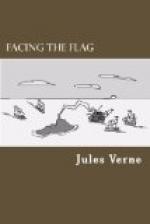The shores of the lake are deserted, but the entrance to the passage is kept by Count d’Artigas’ Malay. I saunter, without any fixed idea, towards Thomas Roch’s laboratory. This reminds me of my compatriot. I am, on reflection, disposed to think that he knows nothing about the presence of a squadron off Back Cup. Probably not until the last moment will Engineer Serko apprise him of its proximity, not till he brusquely points out to him the vengeance he can accomplish.
Then I conceive the idea of enlightening Thomas Roch, myself, of the responsibility he is incurring and of revealing to him in this supreme hour the character of the men who want him to co-operate in their criminal projects.
Yes, I will, attempt it, and may I succeed in fanning into a flame any spark of patriotism that may still linger in his rebellious soul!
Roch is shut up in his laboratory. He must be alone, for never does he allow any one to enter while he is preparing his deflagrator.
As I pass the jetty I notice that the tug is moored in its accustomed place. Here I judge it prudent to walk behind the first row of pillars and approach the laboratory laterally—which will enable me to see whether anybody is with him. When I have gone a short distance along the sombre avenue I see a bright light on the opposite side of the lagoon. It is the electric light in Roch’s laboratory as seen through a narrow window in the front.
Except in that particular spot, the southern shore of the lake is in darkness, whereas, in the opposite direction, the Beehive is lit up to its extremity at the northern wall. Through the opening in the dome, over the lake I can see the stars shining. The sky is clear, the tempest has abated, and the squalls no longer penetrate to the interior of Back Cup.
When near the laboratory, I creep along the wall and peep in at the window.
Thomas Roch is there alone. The light shines full on his face. If it is somewhat drawn, and the lines on the forehead are more pronounced, his physiognomy, at least, denotes perfect calmness and self-possession. No, he is no longer the inmate of Pavilion No. 17, the madman of Healthful House, and I ask myself whether he is not radically cured, whether there is no further danger of his reason collapsing in a final paroxysm.
He has just laid two glass phials upon the table, and holds a third in his hand. He holds it up to the light, and observes the limpidity of the liquid it contains.
I have half a mind to rush in, seize the tubes and smash them, but I reflect that he would have time to make some more of the stuff. Better stick to my first plan.
I push the door open and enter.
“Thomas Roch!” I exclaim.
He has not heard, nor has he seen me.
“Thomas Roch!” I repeat.
He raises his head, turns and gazes at me.
“Ah! it is you, Simon Hart!” he replies calmly, even indifferently.




